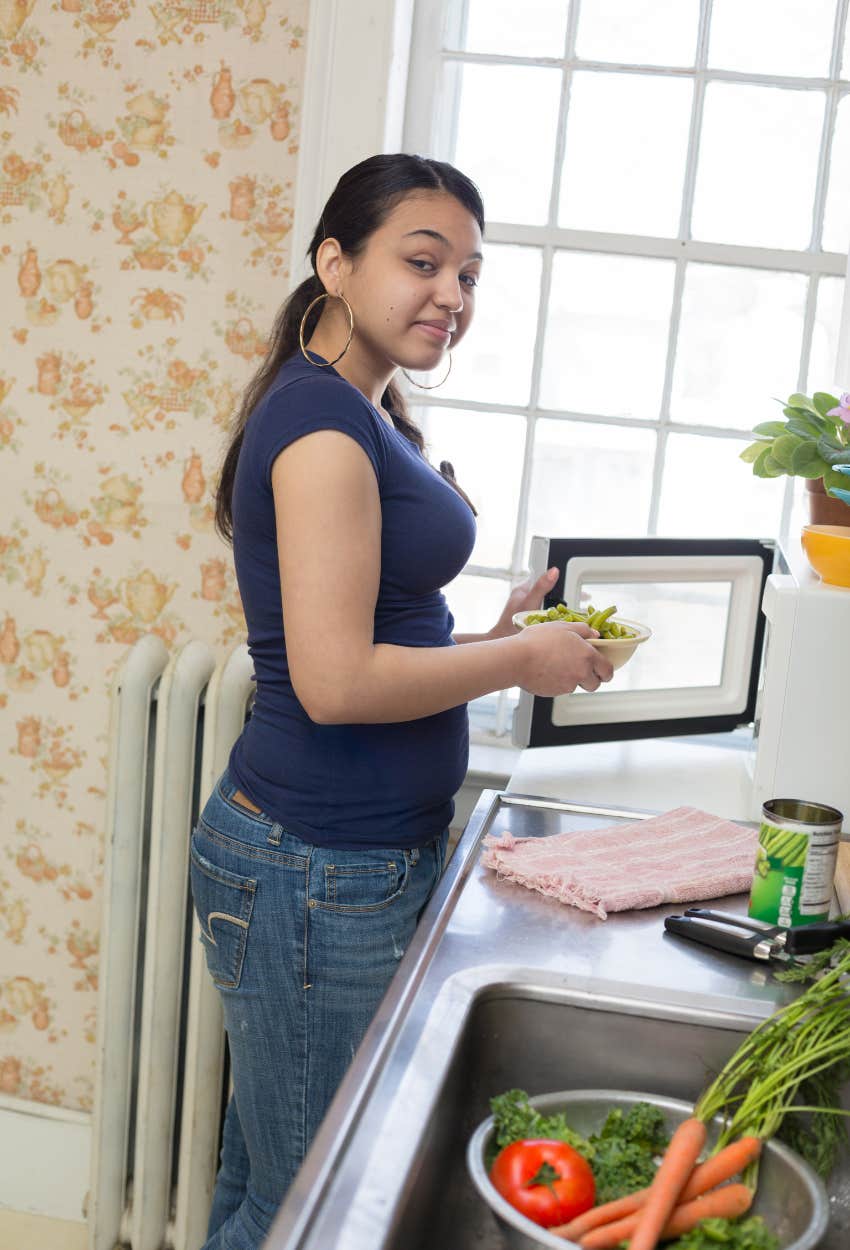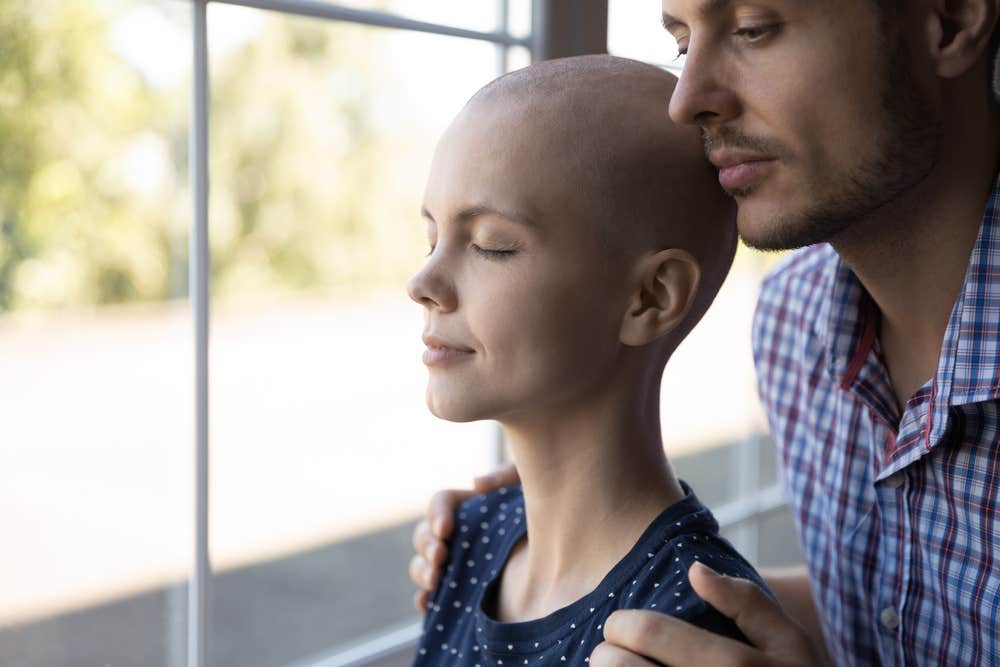Woman Diagnosed With Stage 4 Breast Cancer Reveals The 6 Things She Refuses To Ever Do Again
She is determined to live her life to the fullest, and the healthiest!
 Jose Calsina | Shutterstock
Jose Calsina | Shutterstock After surviving a stage 4 breast cancer diagnosis, Somya Prakash decided to make some serious changes to her everyday life. These changes were as little as the way she reheats her food, and they were as significant as reframing her entire outlook on her emotional state.
She took to TikTok to share why her new outlook meant never going back to some of the common habits she had engaged in before.
A woman who survived a stage four breast cancer diagnosis revealed the 6 things she refuses to do ever again:
1. Use the microwave to reheat food.
Some research suggests that frequently using a microwave to heat up food may cause cancer due to the low-frequency radiation emitted while in use. When they are set to higher power settings, they may increase the risk of carcinogens in foods, including acrylamides, bisphenol A, and phthalates.
 cglade | Canva Pro
cglade | Canva Pro
Even though carcinogens have the potential to cause cancer, it does not necessarily mean you will get cancer if you use a microwave. However, you may want to consider using a stove or an oven to reheat your meals instead to lower the risk. Prakash specifically mentioned avoiding plastic containers and microwave use, and this, according to research, is directly related to plastics that contain Bisphenol A or BPAs. BPAs are carcinogens used to give plastic its hard texture, and there has been evidence that these chemicals leach into food if the plastics are heated in a microwave. If a container does not clearly indicate that it is BPA-free, it's a good idea to follow Prakash's advice and choose a different heating method.
2. Use spray-on conventional perfume or cologne
In a follow-up video, Prakash explained the reasoning behind this particular decision. She noted that conventional perfumes are often considered toxic due to their use of synthetic chemicals. “Many perfumes on the market contain proprietary blends, which means that manufacturers are not required to disclose their ingredients,” Prakash explained. “The term fragrance can include hundreds of undisclosed chemicals, and many perfumes release VOCs into the air and possible carcinogens.”
Prakash also claimed that after ditching conventional perfumes, her health improved in other aspects. “It’s so amazing cause ever since I've ditched perfumes and body mists, I've noticed that my sense of smell has heightened, and these scents actually give me a headache,” she shared.
3. Rely on only one doctor for medical opinions
If you’ve ever encountered a health crisis, you probably hopped right onto a frantic Google search after speaking with only one doctor. However, instead of psyching yourself out with internet horror stories, it is better to get a second opinion. Different doctors have different skill sets and experiences. That's why there are specialists.
 Josep Suria | Shutterstock
Josep Suria | Shutterstock
Getting a second opinion isn't just important for your physical diagnosis, either. It can help set your mind at ease and allow you to process what you are going through with the confidence that you are making the best possible decision regarding your health.
4. Use products with talc, phthalates or sulfates
Talc, phthalates, and sulfates are commonly found in personal care products such as shampoos, soaps, lotions, and hairsprays. While most of us overlook the dangers of these everyday products, the substances have been linked to cancer.
According to the American Cancer Society, talcum powder might cause cancer in the ovaries if the powder particles (applied to the genital area or on sanitary napkins, diaphragms, or condoms) were to travel through the vagina, uterus and fallopian tubes to the ovaries. Talc can also be contaminated with asbestos, a known carcinogen linked to cancer in the lungs.
If you’re worried about these ingredients, it’s a good idea to check product labels and look for natural or safer alternatives when possible.
5. Suppress emotions
Many cancer patients may feel pressure to put on a brave face for their loved ones, especially during treatment. However, there will be many days when they are overwhelmed by exhaustion, fear, and sadness. There is nothing wrong with needing a shoulder to cry on and a space to vent. In fact, you are doing yourself a disservice if you don't allow yourself an outlet for the myriad emotions caused by the trauma of a serious diagnosis.
 fizkes | Shutterstock
fizkes | Shutterstock
According to the American Cancer Society, survivors with strong emotional support tend to adjust better to the changes following diagnosis and treatment. Patients with good friends and family supporting them report a better quality of life. Having an emotional outlet is also good for healing.
6. Disregard added sugars on ingredient labels
While sugar itself does not necessarily pose a cancer risk, added sugars just might. Added sugars are sugars that are added to foods or beverages during processing or preparation rather than occurring naturally in the food. Some examples of added sugars include high fructose corn syrup, honey, and molasses.
These ingredients provide no nutritional value and contribute to weight gain and other health issues. Some of our favorite foods, which we may believe are entirely healthy, may contain a high amount of added sugars, including yogurt, protein bars, and breakfast cereal. It is always important to be mindful of packaged and processed foods because you have control over what you eat.
Megan Quinn is a staff writer with a bachelor's degree in English and a minor in Creative Writing. She covers news and lifestyle topics that focus on justice in the workplace, personal relationships, parenting debates, and the human experience.

